- News
- Reviews
- Bikes
- Accessories
- Accessories - misc
- Computer mounts
- Bags
- Bar ends
- Bike bags & cases
- Bottle cages
- Bottles
- Cameras
- Car racks
- Child seats
- Computers
- Glasses
- GPS units
- Helmets
- Lights - front
- Lights - rear
- Lights - sets
- Locks
- Mirrors
- Mudguards
- Racks
- Pumps & CO2 inflators
- Puncture kits
- Reflectives
- Smart watches
- Stands and racks
- Trailers
- Clothing
- Components
- Bar tape & grips
- Bottom brackets
- Brake & gear cables
- Brake & STI levers
- Brake pads & spares
- Brakes
- Cassettes & freewheels
- Chains
- Chainsets & chainrings
- Derailleurs - front
- Derailleurs - rear
- Forks
- Gear levers & shifters
- Groupsets
- Handlebars & extensions
- Headsets
- Hubs
- Inner tubes
- Pedals
- Quick releases & skewers
- Saddles
- Seatposts
- Stems
- Wheels
- Tyres
- Health, fitness and nutrition
- Tools and workshop
- Miscellaneous
- Buyers Guides
- Features
- Forum
- Recommends
- Podcast
review
£425.00
VERDICT:
Great frame and excellent ride quality at its core, but let down by the spec – spend more for the next model up
Weight:
12,300g
Contact:
At road.cc every product is thoroughly tested for as long as it takes to get a proper insight into how well it works. Our reviewers are experienced cyclists that we trust to be objective. While we strive to ensure that opinions expressed are backed up by facts, reviews are by their nature an informed opinion, not a definitive verdict. We don't intentionally try to break anything (except locks) but we do try to look for weak points in any design. The overall score is not just an average of the other scores: it reflects both a product's function and value – with value determined by how a product compares with items of similar spec, quality, and price.
What the road.cc scores meanGood scores are more common than bad, because fortunately good products are more common than bad.
- Exceptional
- Excellent
- Very Good
- Good
- Quite good
- Average
- Not so good
- Poor
- Bad
- Appalling
The venerable Specialized Sirrus may have been around a while but this modern version still offers fair dashings of speed, a cushioned ride and even a soupçon of fun. However, this bottom-of-the-range Alloy model feels a little too cheap to live up to the frame's potential.
- Pros: Great ride quality, some decent Specialized own-brand kit, V-brakes do the job
- Cons: Shimano Tourney drivetrain doesn't match frame potential, skinny handlebar
With a proven provenance, it's no surprise to find the latest version of the aluminium-framed Specialized Sirrus Alloy is a very adept performer. In terms of both pedalling effort and control, it reacts quickly and efficiently without being overly affected by under-tread imperfections. Even though it's no lightweight, the Sirrus is eager to get up to a cruise and feels securely connected with the road without ever crashing over bumps.
> Find your nearest dealer here
Stability is really good, particularly at speed, but it's never boringly benign. Point the Sirrus into a corner and it'll turn in promptly and assuredly. It's a rewarding sensation and testament to the fact that – with more than three decades' experience – the bike market's big players know how to dial in an alloy frame. Even if you fancy taking the Sirrus for an off-road jaunt, you'll find things stay the right side of twitchy right down to minimum speeds.
Comfort is a high point, especially when it comes to subduing shocks at the rear. Of course, the natural limitations of the Sirrus's flat handlebar mean you can't alter your position too much, which tends to result in hands suffering over time. But Specialized's Body Geometry XCT grips are very comfortable and the steel fork does its best, so it's fine for one or two-hour blasts and if you're planning frequent refreshment stops on a day-long leisure ride, there won't be a problem.
Position in all other respects is perfect, with weight spread nicely and a feeling that at any moment you could just as happily sit up and relax or get your head down and plough on.
Frame
The reason for such a capable ride is thanks to the Sirrus's frame. Only a few years ago, the Sirrus and its drop bar sibling the Roubaix shared some similarities in design, with both sporting tapered top tubes that featured just the hint of a curve as they met their respective head tubes. The old Roubaix actually had a more pronounced swan neck, but there was a feeling of family likeness and I always thought that made a lot of sense, as both bikes were created to provide similar kinds of performance – comfort with speed – albeit for different markets and in different packages.
Since then the Roubaix has gone off on its merry way with straight tubes and now finds comfort via the Future Shock suspension system. However, the modern Sirrus has retained and actually enhanced its curved top tube. As a pure shape, the frame is very pretty, although the styling of this model has gone down the subtle utilitarian/urban road with a largely matt black finish. There is a hidden highlight, though, in the reflective black paint Specialized has used for its branding – it really does work well and will have you standing out when caught in headlights after dark.
In terms of practicalities, everything else is as you'd expect. The Sirrus frame is made of Specialized's A1 Premium Aluminium tubes that have been manipulated and butted to suit. The overall frame shape is what Specialized refers to as 'Fitness Geometry', which is just what it seems.
And you get rear rack and mudguard mounts to turn the Sirrus into a true year-round workhorse, although niceties such as internal cable routing are missing on this budget model.
Good components
It shows you how much the cycle market has moved on in recent years when it's a talking point that a hybrid hasn't been fitted with disc brakes. The Sirrus's unbranded V-brakes are actually pretty good, though, and I had no hesitation in taking on descents at speed. Outright power and even modulation isn't a mile away from bottom-end discs and V-brakes are perhaps a little less overwhelming for new riders to maintain. In fact, rather worryingly, the unmarked V-brakes are one of the Sirrus's componentry highlights.
But before we move on to negatives, let's also have some deserved praise for Specialized's renowned Body Geometry kit. The Sirrus comes with both those fantastic BG XCT grips I mentioned above and a Canopy Sport saddle, meaning that contact points are as plush as you're likely to find at this price. Teamed with decent mitts, my hands didn't suffer in the slightest and I've spent most of my time with the Sirrus wearing only unpadded cycling jeans, again with no problems. If anything, I'd say the saddle is perhaps a tad too chunky, but it's a safe bet for new riders.
Not so good…
More annoying is the handlebar and the stem, which was obviously going to be too short for me from the off. No problem, I thought, it's an aheadset, I'll just swap over a longer spare stem or borrow one from another bike. Unfortunately, rather too late I realised my efforts would be in vain because the Sirrus is fitted with a 25.4mm handlebar and all the stems at my disposal were 31.8mm.
In fairness to Specialized, it is not the only brand to spec skinny bars on its entry-level hybrids – Trek, for one, does it as well. But it does result in two things: the 'cockpit' feels a bit unsubstantial and cheap; and it's really, really annoying when you think it'll be easy to swap in a longer stem yet all you have are those that fit 31.8mm bars. (For the record, every other model in the Sirrus range, including the standard Sirrus with disc brakes, comes with a 31.8mm bar.)
The stem issue is easily fixed and will probably be only a minor irritation for riders with a few spares or other bikes at their disposal. Far more fundamental is the Shimano Tourney gearset. Don't worry about the numbers – the 7-speed 12-32t cassette with triple chainset provides a wide enough range for riders to deal with any challenge – it's the operation that's most frustrating.
Changes at the rear can be unreliable and operation is generally just a bit clunky, although the front mech worked fine. I'm traditionally a fan of Shimano's cheaper kit but the gap between Tourney and even Acera/Altus is noticeable and anybody used to components from Shimano's higher line-ups will be underwhelmed, especially given the Sirrus frame seems to deserve better.
Wheels
Rounding off the package is a fairly nondescript wheelset. The unbranded double wall 700C aluminium rims on unbranded aluminium hubs don't promise much but they roll straight and smooth. Even more praiseworthy are the 32mm Specialized Nimbus tyres with Flak Jacket puncture protection. They suit the Sirrus perfectly, with a fine combination of grip and speed, and just enough cushioning.
Overall, the wheel and tyre package does nothing to improve the Sirrus V-Brake's total weight, which is comparable to its rivals at just under 12.5kg but still nothing to write home about. It's worth considering that spending just a couple of hundreds pounds more could really reduce the weight of a potential bike purchase, though.
> Beginner's Guide: What's a hybrid and why might you want one?
And that's a theme that pervaded my entire experience of this Sirrus model. Despite the ride quality, this version of the Sirrus just doesn't seem satisfying enough. In terms of spec, corners have been cut and the cheapest viable kit has been fitted to meet the budget. That's fair enough. But if I was buying, I'd desperately try to find at least another £100 and step up to the standard Sirrus with Promax hydraulic discs, a few crucial Shimano Altus components and even – praise be – a 31.8mm handlebar. It would be well worth the extra £100 because, at its heart, the Sirrus is just as good as it's always been.
Verdict
Great frame and excellent ride quality at its core, but let down by the spec – spend more for the next model up
road.cc test report
Make and model: Specialized Sirrus Alloy
Size tested: Large
About the bike
List the components used to build up the bike.
Frame: Specialized A1 Premium Aluminum, Fitness Geometry, fully manipulated butted tubing, external cable routing, V-brake, quick-release, rack/mudguard mounts
Fork: Steel, V-brake, 1-1/8in steerer, QR, rack/mudguard mounts
Wheels: Unbranded 700C double wall alloy rims on unbranded alloy hubs
Tyres: Specialized Nimbus, 26TPI, Flak Jacket protection, 700x32mm
Shifters: Shimano EF510, EZ-Fire Plus
Front derailleur: Shimano Tourney, top-swing, 31.8mm band clamp
Rear derailleur: Shimano Tourney TX, 8-speed
Chainset: Shimano Tourney triple (48/38/28T)
Cassette: Shimano HG200, 7-speed, 12-32t
Chain: KMC X8 w/ Missing Link, 7-speed
Bottom bracket: BSA, square-taper, 68mm
Brakeset: Unbranded V-brake, linear pull
Saddle: Specialized Canopy Sport, steel rails, 155mm
Seatpost: Alloy, 12mm offset, 2-bolt clamp, 27.2mm
Handlebar: Double-butted alloy, 60mm, 5-degree backsweep, 25.4mm
Stem: Alloy, 20-degree, 25.4mm clamp
Headset: Aheadset
Grips: Specialized Body Geometry XCT, lock-on
Tell us what the bike is for and who it's aimed at. What do the manufacturers say about it? How does that compare to your own feelings about the bike?
Urban riding, leisure and commuting.
Specialized says: "If you're going to get in shape you need to move, and nothing wants to help you move faster than our Sirrus. It takes a no-nonsense approach to its design, giving you everything that you need and nothing that you don't. It's constructed from a durable, reliable, and lightweight A1 Premium Aluminium, and it features a reliable set of components that are built to withstand years of daily abuse, like comforting Body Geometry touch points that are sure to take the sting out of long rides. You'll also find rack and fender mounts, so lugging your stuff around town just got a whole lot easier. Complacency just met its match."
Where does this model sit in the range? Tell us briefly about the cheaper options and the more expensive options
This Sirrus Alloy model sits at the very bottom of the range. The next model up - the standard Sirrus - features hydraulic disc brakes, while even further up the range there are Sirrus models with carbon-fibre frames.
Frame and fork
Overall rating for frame and fork
9/10
Tell us about the build quality and finish of the frame and fork?
Build quality and finish is excellent.
Tell us about the materials used in the frame and fork?
The frame is made from Specialized's A1 Premium aluminium. The fork is steel.
Tell us about the geometry of the frame and fork?
Compact frame shape with fairly straight fork. Overall effect is a nice compromise between being orientated for speed and comfort.
How was the bike in terms of height and reach? How did it compare to other bikes of the same stated size?
I tested a size L (583mm effective top tube) which felt a little short. Best to ignore the nominal sizing and sit on one in real to check for fit.
Riding the bike
Was the bike comfortable to ride? Tell us how you felt about the ride quality.
Very comfortable to ride. Position was excellent with just the right amount of feedback from road surface.
Did the bike feel stiff in the right places? Did any part of the bike feel too stiff or too flexible?
Power delivery was never wanting, but neither was ride quality too harsh.
How did the bike transfer power? Did it feel efficient?
It felt very efficient.
Was there any toe-clip overlap with the front wheel? If so was it a problem?
No.
How would you describe the steering? Was it lively neutral or unresponsive? Fairly responsive but not twitchy.
Tell us some more about the handling. How did the bike feel overall? Did it do particular things well or badly?
Surprisingly stable at high speed.
Which components had the most effect (good or bad) on the bike's comfort? would you recommend any changes?
Saddle was good, although more experienced riders may want something a tad slimmer. Wheels/tyres also contributed to comfort.
Which components had the most effect (good or bad) on the bike's stiffness? would you recommend any changes?
Wheels seemed to do the job although, in time, you may want to swap them for something lighter.
Which components had the most effect (good or bad) on the bike's efficiency? would you recommend any changes?
Although it didn't affect efficiency overall, the Shimano Tourney drivetrain was frustrating.
Rate the bike for efficiency of power transfer:
8/10
As efficient as you'd hope from a hybrid/leisure/commuting bike.
Rate the bike for acceleration:
7/10
Eager to get up to speed.
Rate the bike for sprinting:
7/10
Fairly stable and responsive when out of the saddle.
Rate the bike for high speed stability:
10/10
Really enjoyed descending at speed – the Sirrus very felt assured.
Rate the bike for cruising speed stability:
8/10
Happy to cruise without issues.
Rate the bike for low speed stability:
7/10
Slightly less stable at low speed, but still good.
Rate the bike for flat cornering:
8/10
Fine.
Rate the bike for cornering on descents:
9/10
Better at speed.
Rate the bike for climbing:
7/10
Decent climbing ability.
The drivetrain
Rate the drivetrain for performance:
5/10
Really didn't like it – clunky and frustrating.
Rate the drivetrain for durability:
6/10
Probably will last for ever, should you want it to!
Rate the drivetrain for weight:
5/10
Not a particularly light setup.
Rate the drivetrain for value:
6/10
It's branded Shimano kit, but not very good.
Tell us some more about the drivetrain. Anything you particularly did or didn't like? Any components which didn't work well together?
I wasn't happy with the Tourney drivetrain at all. Gear changes weren't impressive and performance felt a bit low rent.
Wheels and tyres
Rate the wheels for performance:
7/10
Fairly good despite inauspicious appearances.
Rate the wheels for durability:
8/10
Should roll well for a long time.
Rate the wheels for weight:
6/10
Not particularly light, although par for the course in this market.
Rate the wheels for comfort:
8/10
Quite impressed by what the wheels contributed to the ride quality.
Rate the wheels for value:
5/10
About right.
Tell us some more about the wheels.Did they work well in the conditions you encountered? Would you change the wheels? If so what for?
I wouldn't be in a rush to change the wheels as they perform perfectly well, but a better quality wheelset will help acceleration and general performance when climbing and getting up to speed.
Rate the tyres for performance:
9/10
Quite impressive – good grip and cushioning.
Rate the tyres for durability:
9/10
With Flak Jacket protection, they should serve riders well.
Rate the tyres for weight:
6/10
Rate the tyres for comfort:
8/10
Added a little extra comfort to the package.
Rate the tyres for value:
8/10
Decent quality tyres, good value on a bike at this price.
Tell us some more about the tyres. Did they work well in the conditions you encountered? Would you change the tyres? If so what for?
Pretty good tyre for general riding and commuting. No reflective sidewall is a shame, although the Sirrus has reflective paint highlights on its frame anyway.
Controls
Rate the controls for performance:
7/10
They worked fine, although the handlebar and stem were a little underwhelming.
Rate the controls for durability:
7/10
Should be fine.
Rate the controls for weight:
7/10
Decent.
Rate the controls for comfort:
9/10
Body Geometry grips were very impressive.
Rate the controls for value:
5/10
Skinny handlebar shows cost-saving.
Anything else you want to say about the componentry? Comment on any other components (good or bad)
V-brakes may seem fairly old-school these days, but those fitted to the Sirrus were actually reasonably good.
Your summary
Did you enjoy riding the bike? Yes
Would you consider buying the bike? Not this model.
Would you recommend the bike to a friend? Not this model.
How does the price compare to that of similar bikes in the market, including ones recently tested on road.cc?
Pretty much typical price for entry-level hybrid from a big brand.
Rate the bike overall for performance:
8/10
Rate the bike overall for value:
6/10
Use this box to explain your overall score
Although the Sirrus frame is a real gem, this model's overall package lets it down. If anything, the spec serves to show the gap in class between well-proven frame design and manufacture, and budget componentry. Spend another £100 on the next model up and this would be an 8.
About the tester
Age: 39
I usually ride: Islabikes Beinn 29 My best bike is: 25-year-old Dawes Galaxy
I've been riding for: Over 20 years I ride: Most days I would class myself as: Experienced
I regularly do the following types of riding: commuting, touring, sportives, general fitness riding, mountain biking, leisure



































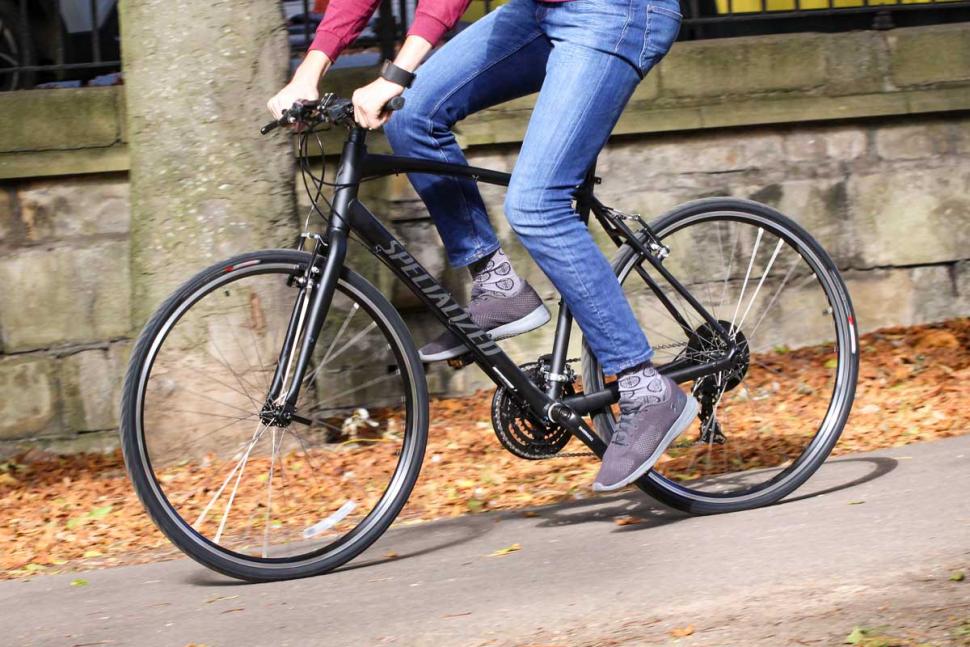

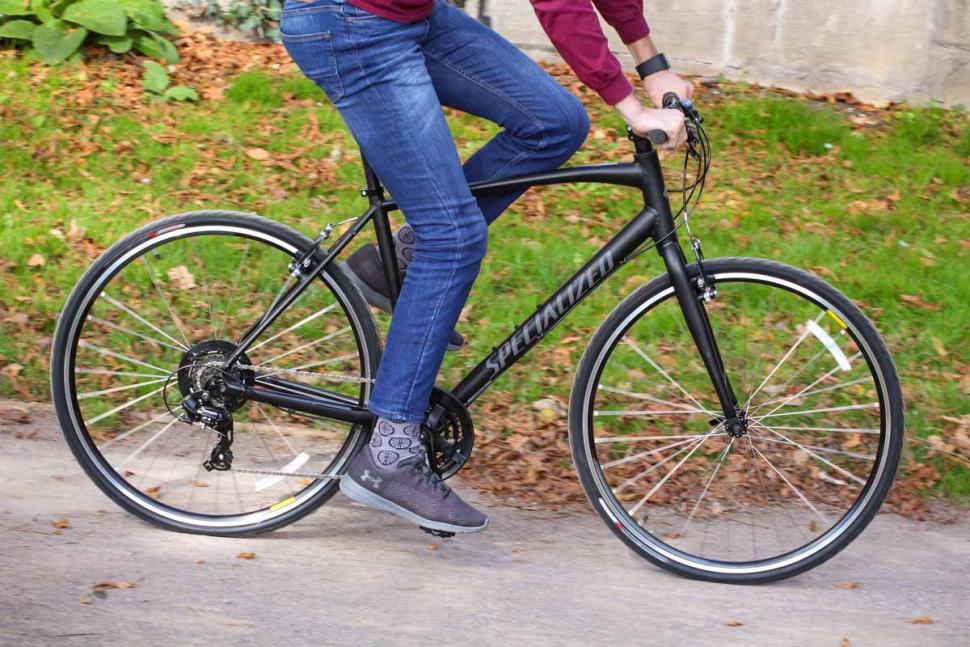
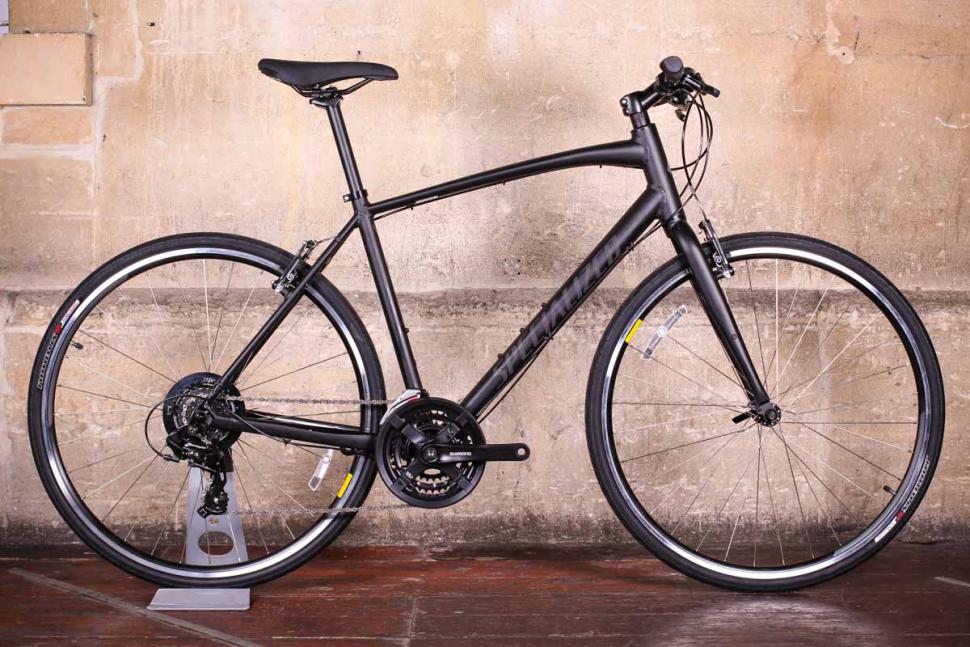
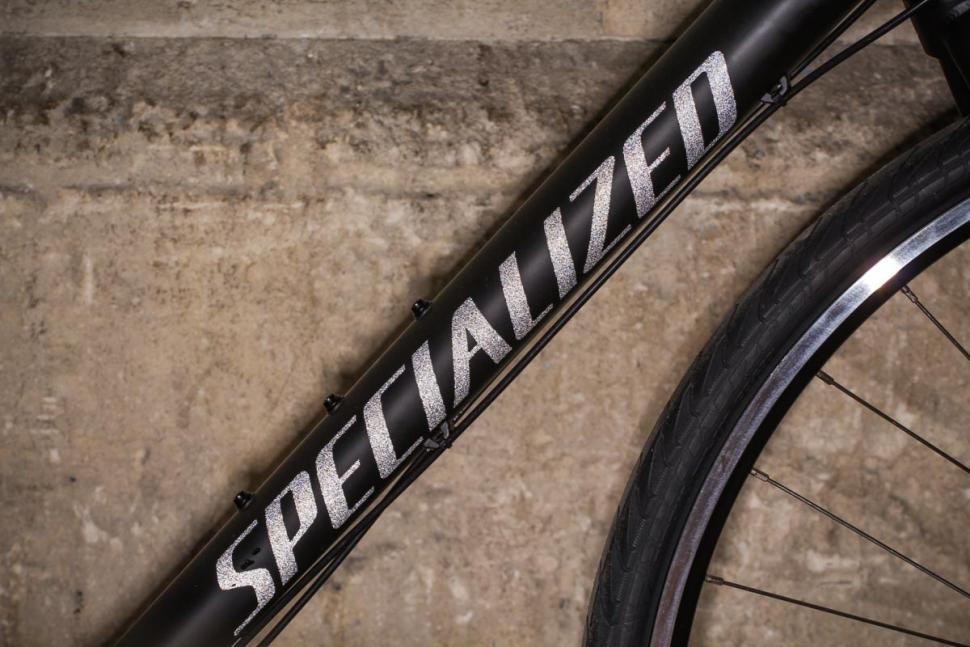
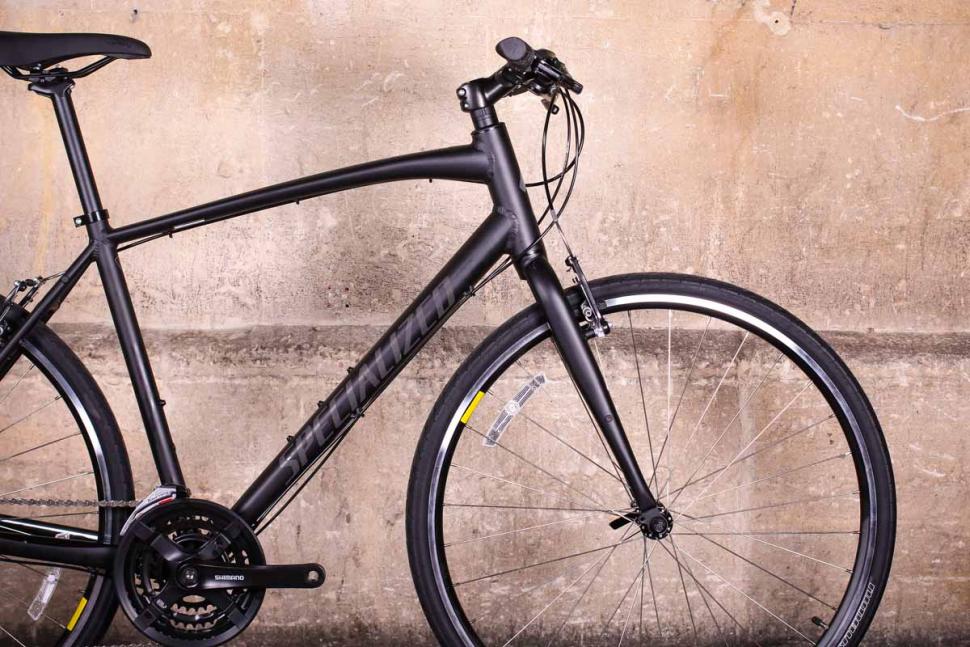
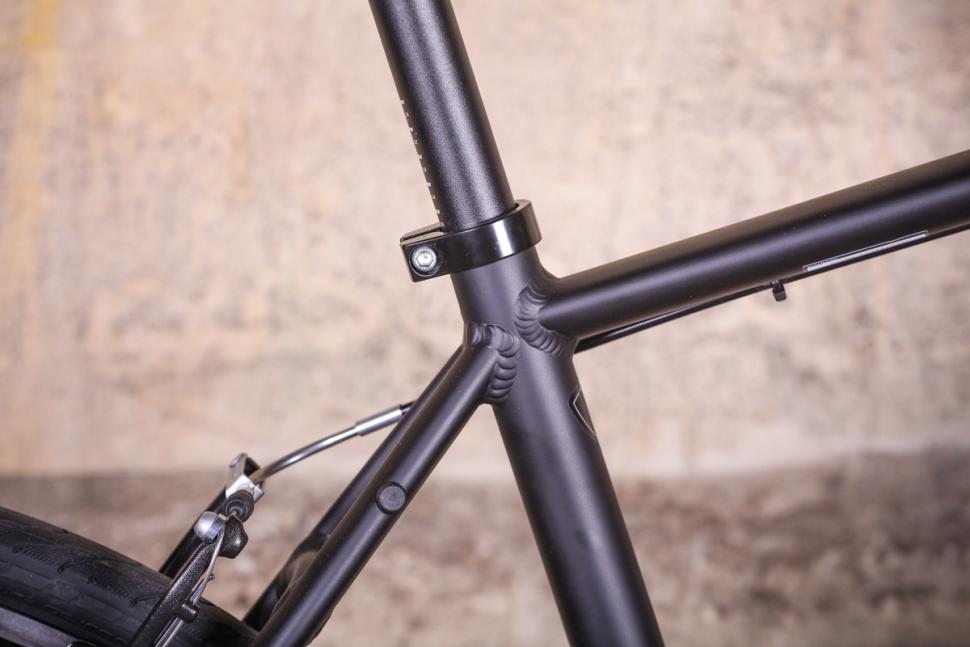

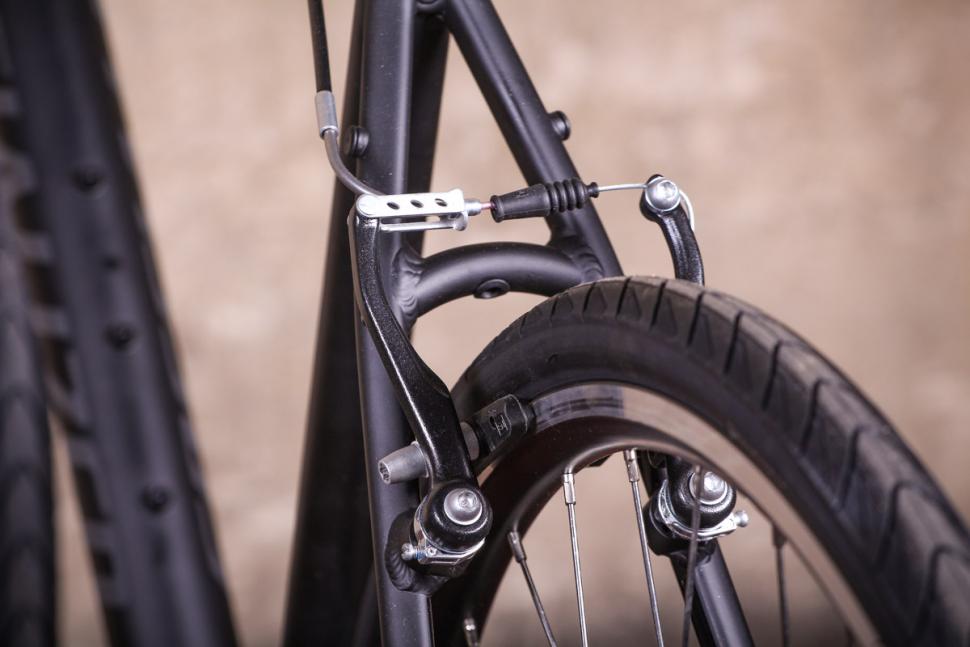
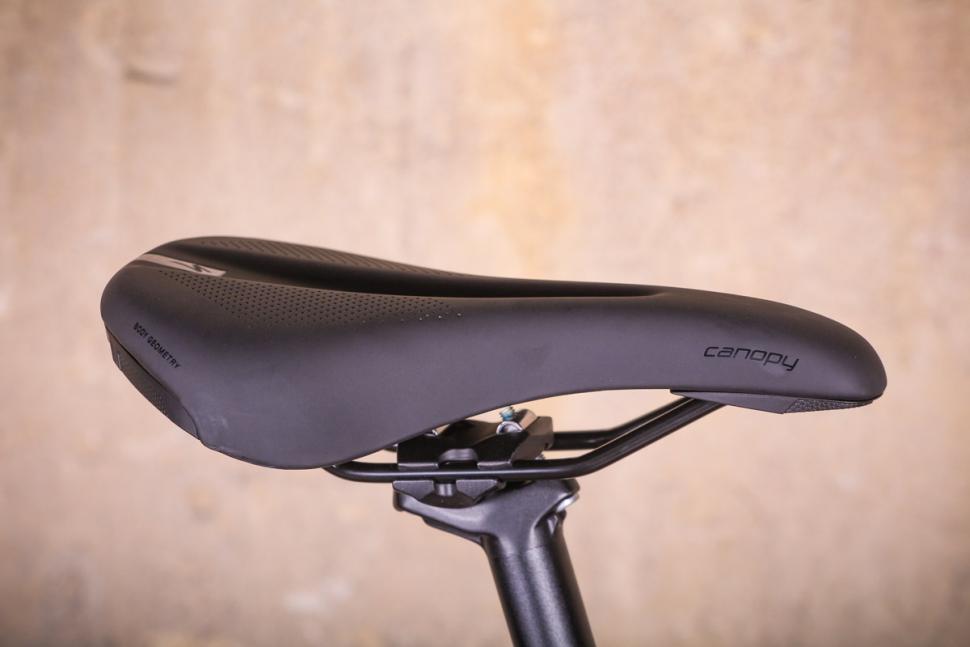
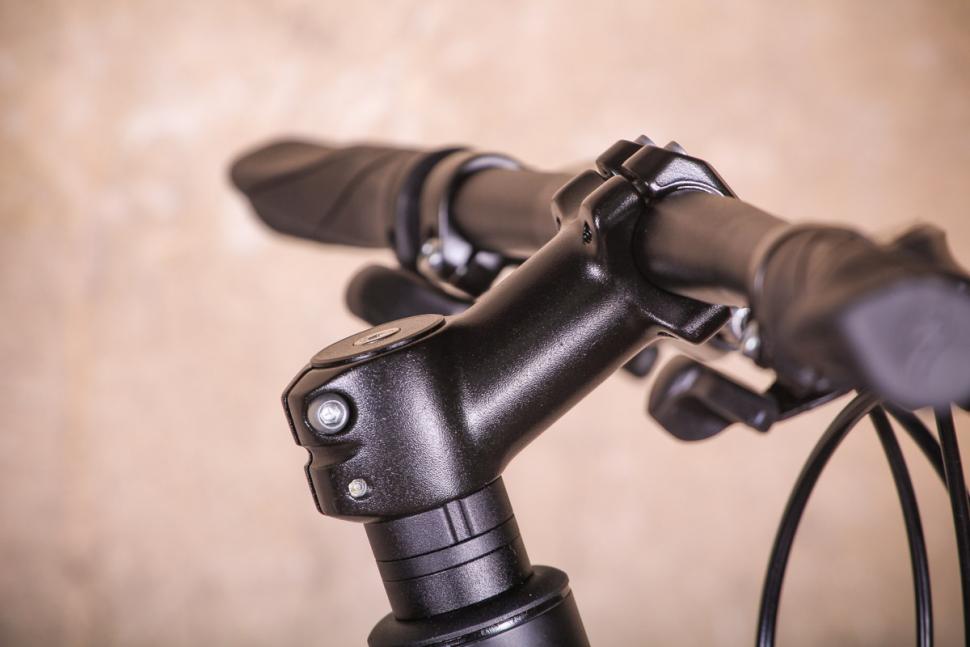

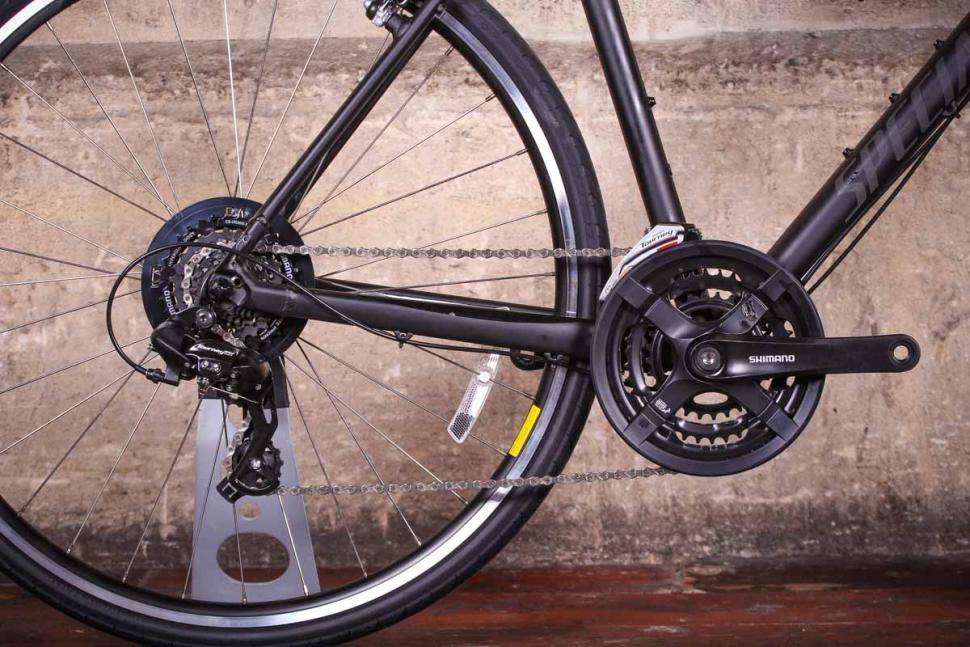
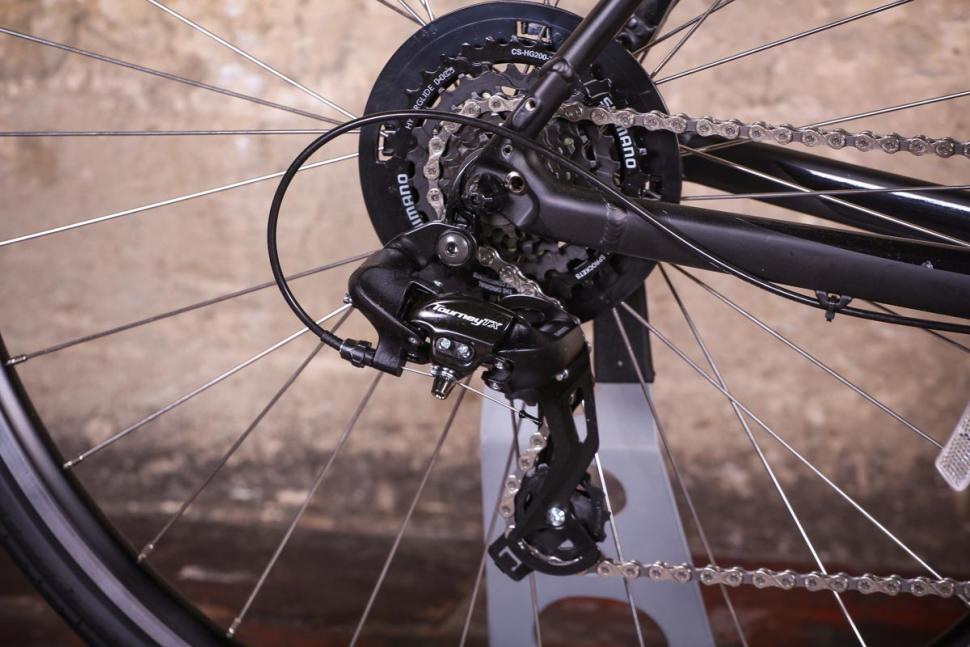
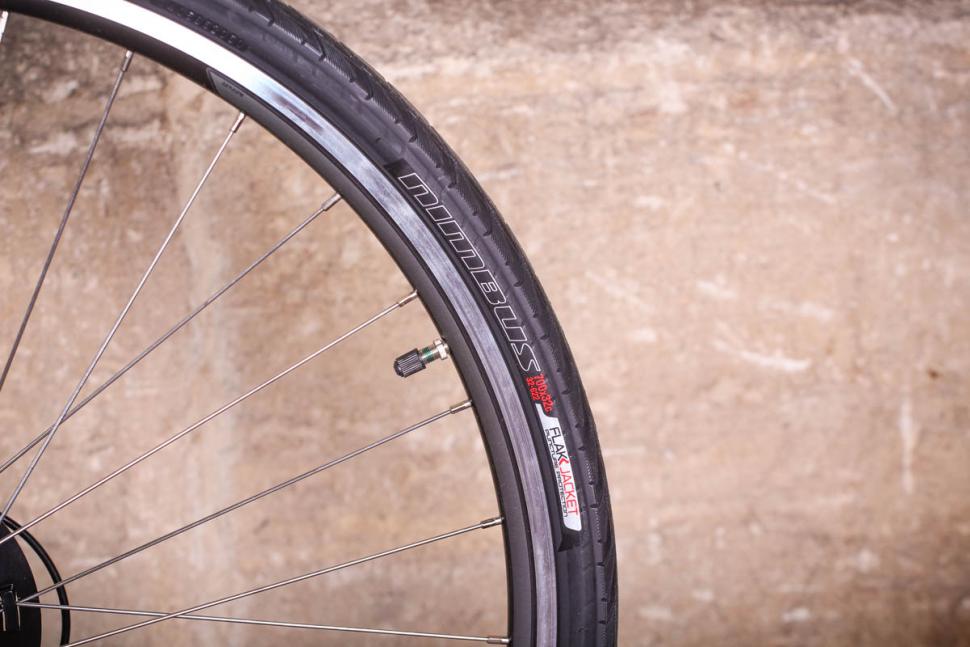
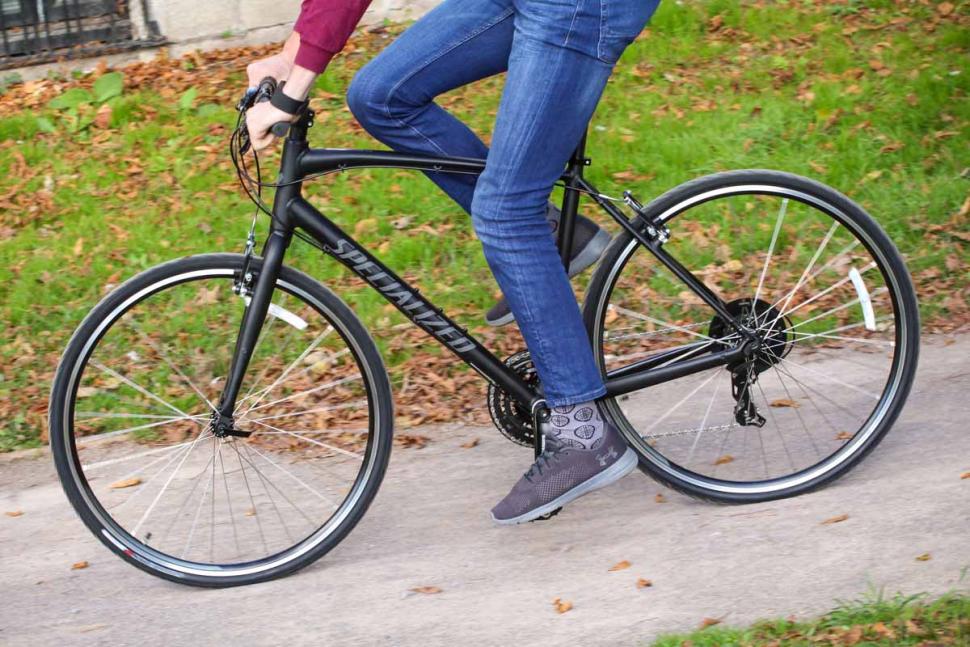
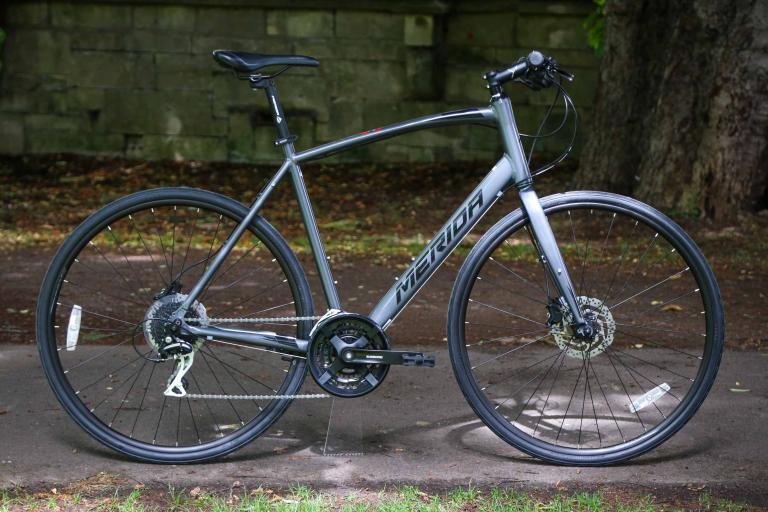
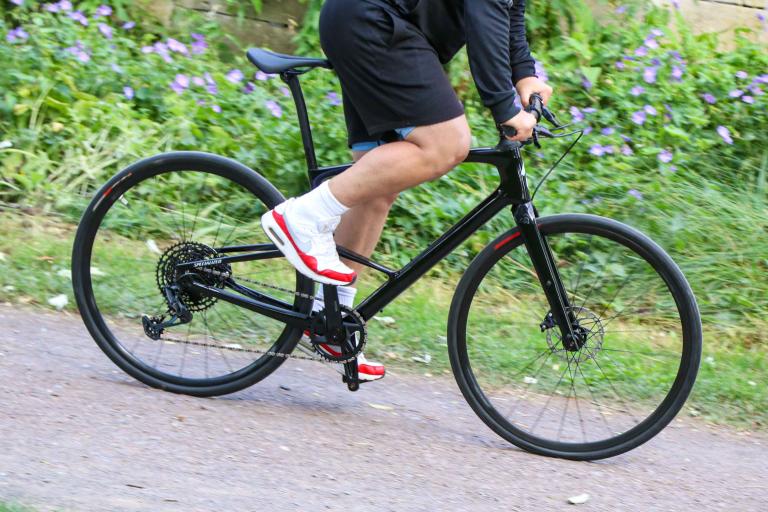
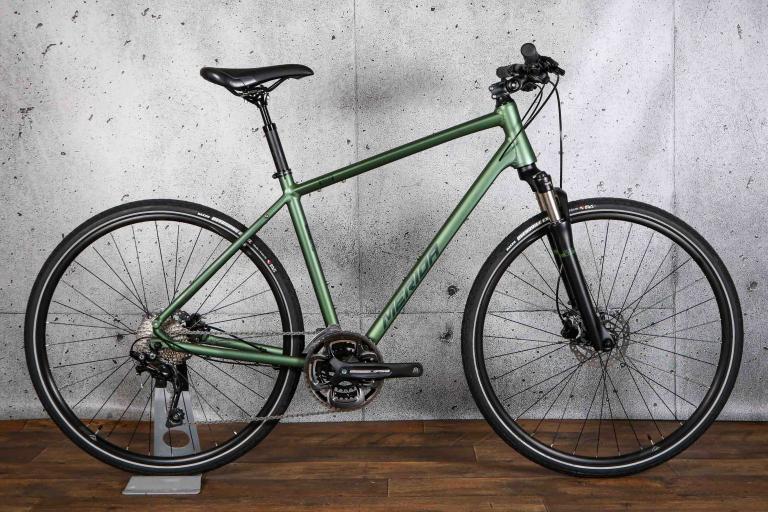
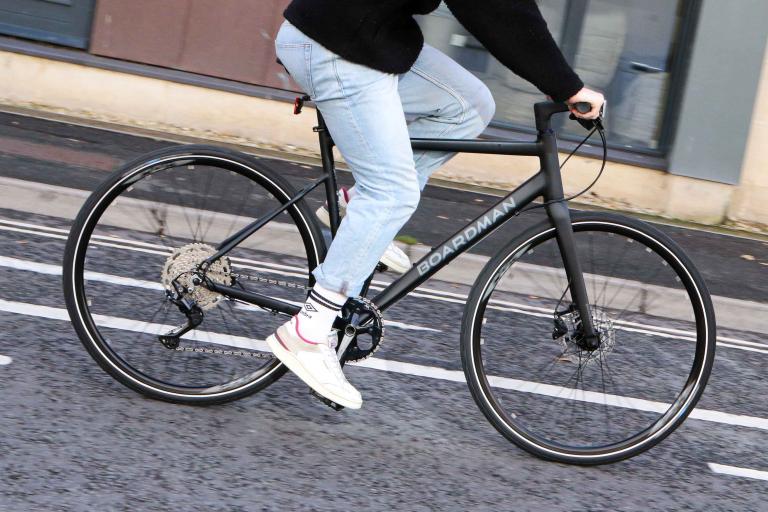
As a former motorcyclist, including a year (many years ago) as a motorcycle courier, and current many thousands of miles a year cyclist in London,...
All part of Rishi's plan to crackdown on the "war against motorists". Political jingoism at it's finest!
"Anecdotally" tyre fitters are reporting EVs wearing out tyres in as little as 10 000 miles, and tyres on my ICE cars are lasting at least 25 000...
Calipers: not apealing.Red Levers: The Most Beatiful Levers In The World ! Gonna work some overtime.
Because what you want are four execs from a company so successful they have just gone out of business.
Suvi is getting paid way too much. Needs a wages review. And quick....
They're not losses - they're "negative profits"!
I would say that a wide neck opening would be fine for many cyclists who, like me, wear a buff when it is chilly. They're a great vfm additional...
Man simultaneously possessing and eating a series of rich cakes decries pastry chefs for supplying unhealthy food......
That's probably cost you over a minute now across all your rides.